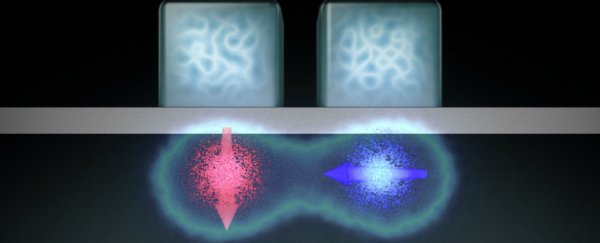For decades, researchers have been trying to build a computer that harnesses the enormous potential of quantum mechanics. Now engineers from the University of New South Wales (UNSW) in Australia have overcome the final hurdle, by creating a quantum logic gate in silicon - the same material that today's computer chips are made from.
The newly developed device allows two quantum bits - or qubits - to communicate and perform calculations together, which is a crucial requirement for quantum computers. Even better, the researchers have also worked out how to scale the technology up to millions of qubits, which means they now have the ability to build the world's first quantum processor chip and, eventually, the first silicon-based quantum computer.
Right now, regular computer chips store information as binary bits, which are either in a 0 or 1 state. This system works well, but it means that there's a finite amount of data that can be processed. Qubits, on the other hand, can be in the state of 0, 1, or both at the same time, which gives quantum computers unprecedented processing power… if we can work out how to build them.
Scientists are getting pretty good at controlling these qubits, but what they've struggled with is getting them to communicate with each other and perform operations. This is essential for forming what's known as a logic gate - a building block of all digital circuits, which takes two input values and provides a new output based on programmed logic.
Quantum logic gates have been built in the past, but they've all used exotic materials, which isn't compatible with today's silicon-based computer infrastructure. A silicon quantum logic gate was the last physical building block remaining to be built in order to create a silicon-based quantum computer.
"Because we use essentially the same device technology as existing computer chips, we believe it will be much easier to manufacture a full-scale processor chip than for any of the leading designs, which rely on more exotic technologies," project leader Andrew Dzurak said in a press release. "This makes the building of a quantum computer much more feasible, since it is based on the same manufacturing technology as today's computer industry."
The challenge in building quantum logic gates is the fact that, in order to get two qubits to 'talk' to each other, they have to be incredibly close together - generally within 20 to 40 nanometres of each other - and this makes controlling them incredibly difficult.
The team overcame this by effectively copying the set-up of traditional chips. In that set-up, binary bits are defined by tiny semiconductor devices known as transistors. About 1 billion of these transistors has been packed onto each silicon chip in your smartphone or computer.
Quantum bits, on the other hand, are defined by the spin of a single electron. But by reconfiguring traditional transistors to only be associated with one electron, Dzurak and his team were able to have them define qubits instead.
"We've morphed those silicon transistors into quantum bits by ensuring that each has only one electron associated with it. We then store the binary code of 0 or 1 on the 'spin' of the electron, which is associated with the electron's tiny magnetic field," said Menno Veldhorst, the lead author of the research, which has been published in Nature.
The team then showed that they could use metal electrodes on these transistors to control the qubits and get them to communicate with each other, creating a functioning logic gate.
The researchers have already patented a design "for a full-scale quantum computer chip that would allow for millions of our qubits, all doing the types of calculations that we've just experimentally demonstrated," Dzurak explains, and they believe they could achieve a simple version within five years.
Once we have a silicon quantum chip, we'll then be able to build a functioning quantum computer, which would revolutionise the way we process information, and would have huge impacts on finance, research, and security.
There's still a lot of engineering to be done, but it's a pretty exciting time to be alive.
